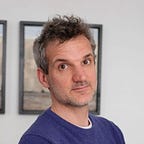In Search of Free Will
Human freedom is a matter of perspective
At every waking moment we are faced with countless choices.
It’s an irony of being human that we must make choices — we have no choice but to choose. Even if we decided not to choose, then we are still choosing.
Choice is rooted into our very being. To choose is to be human and to become as individuals and communities.
If you are of sound mind, you probably feel some responsibility for your choices. That we ourselves make our own choices is an assumption we have to make as we make choices. We guide smaller, day-to-day choices with other, more fundamental, choices such as what is morally right or wrong.
This is why we intuitively feel free to make choices knowing that alternative actions would have been possible. When we make choices we deem to be wrong, we can look back on them with regret.
We also assume that other people are free to choose. This assumption structures our relationships, since we deem ourselves capable of judging others’ choices.
This is the feeling of “free will”. Fundamentally, it is the belief that your decision — which you alone are responsible for — is the origin of your action.
